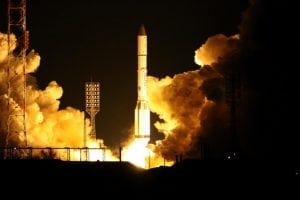Latest News
[Via Satellite 12-29-2014] International Launch Services (ILS) lofted the Astra 2G satellite for SES on Dec. 27 using a Proton Breeze M booster. The rocket carried the six-ton satellite into Geostationary Transfer Orbit (GTO) after a mission lasting nine hours and 12 minutes.
The Astra 2G mission was significantly delayed after a Federal Proton mission operated by the Russian government failed, consequently grounding the launch vehicle for months. Proton has flown four times since the incident, completing missions for the Russian government, Gazprom Space Systems, Russian Satellite Communications Company (RSCC) and now SES. The December launch marks the 24th SES satellite ILS has launched.
“The Astra 2G satellite completes our significant replacement investments at a strategic orbital neighborhood over Europe and provides 10 incremental transponders for expansion while cementing our unique co-positioning satellite back-up-scheme,” said Martin Halliwell, CTO of SES. “The spacecraft furthermore includes the capability to connect West Africa to Europe via Ka band. In combination with Astra 2E and Astra 2F which were launched in September 2012 and 2013 respectively, Astra 2G is the culmination of our fleet renewal program at the 28.2/28.5 degrees orbital arc.”
Astra 2G carries 62 Ku-band transponders and 4 Ka-band transponders. Built on the Airbus Defence and Space Eurostar E3000 platform, the satellite generates 13 kW of power and has a design life of 15 years. Astra 2G will also support the e-health platform SATMED, connecting doctors in isolated areas.
Stay connected and get ahead with the leading source of industry intel!
Subscribe Now